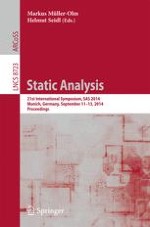2014 | Buch
Static Analysis
21st International Symposium, SAS 2014, Munich, Germany, September 11-13, 2014. Proceedings
herausgegeben von: Markus Müller-Olm, Helmut Seidl
Verlag: Springer International Publishing
Buchreihe : Lecture Notes in Computer Science
